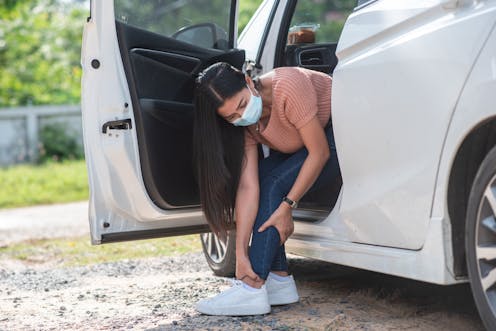COVID-19 increases the chance of getting an autoimmune condition. Here's what the science says so far
- Written by Magdalena Plebanski and Rhiane Moody

SARS-CoV-2, the virus that causes COVID-19, can sometimes cause the immune system to mistakenly attack the person’s own body. This process, known as “autoimmunity”, can damage a number of different organs.
After COVID-19, a small number of patients have developed a range of different autoimmune diseases. This includes Guillain-Barré syndrome, a disorder in which the immune system attacks nerves, often resulting in tingling and weakness in arms and legs.
There are also reports of autoimmune responses that don’t clearly correspond to any known autoimmune disease. This suggests COVID-19 disease may trigger new autoimmune illnesses.
The science on how and how often this occurs is still emerging. But here’s what we know so far.
Read more: Explainer: what are autoimmune diseases?
First, a quick recap on the immune system
The immune system is tightly regulated. Within it, immune cells known as B and T lymphocytes – the soldiers of the immune system – are normally able to distinguish between itself versus external targets.
When the system becomes confused, B and T cells may start to target our own bodies, which we call autoimmunity.
Viral infection can sometimes trigger this confusion, resulting in autoimmune diseases.
How do viruses trigger autoimmunity?
Two of the key mechanisms are “molecular mimicry” and “bystander activation”.
Molecular mimicry occurs when the part of the virus the B or T cells recognise looks similar to a normal protein in our body.
The B or T cell then sees both the viral and the self-protein as something to attack and eliminate.
Read more: Explainer: what is the immune system?
Viral infections can also cause organ damage and cell death directly. When our cells die and burst, they release self-proteins. These would normally stay hidden and wouldn’t trigger an immune reaction.
Bystander activation occurs when B and T cells accidentally get in contact with self-proteins, confusing the immune system, which otherwise is trained to ignore self-proteins.
What autoimmune conditions can COVID-19 trigger?
There are multiple reports of antibodies which recognise self-proteins, also known as autoantibodies, emerging in people with severe COVID-19.
Some of these autoantibodies that emerge in people with severe COVID recognise autoantibodies associated with well-known autoimmune diseases, including:
-
systemic lupus erythematosus (SLE), which affects joints, skin, blood cells as well as organs such as the brain, lungs and kidneys
-
rheumatoid arthritis, affecting the joints
-
Guillain-Barré syndrome, mentioned above
-
immune thrombocytopenia, which attacks blood platelets, resulting in excessive bruising and bleeding
-
autoimmune haemolytic anaemia, which attacks red blood cells which can result in breathlessness, tiredness, headaches and chest pain.
In the reports that describe the onset of these diseases after COVID-19, the autoimmune symptoms start during or after the respiratory symptoms.
It’s unclear whether the patients were already predisposed to these diseases, or the infection unmasked an autoimmune process that had already begun. Or perhaps the infection triggered completely new autoimmunity. The triggers may even vary for different people.
COVID-19 may also trigger new autoimmune responses and, potentially, new autoimmune diseases. This has already occurred with a condition called multi-system inflammatory syndrome in children (MIS-C).
Originally described as a Kawasaki-like disease associated with COVID-19, MISC-C causes additional symptoms in children and adolescents with the condition. This includes rashes, shock, excessive bleeding, heart problems, and severe gastrointestinal symptoms.
Autoantibodies measured in children diagnosed with MIS-C have a large variety of targets. Many have no association to known autoimmune diseases, and instead are associated with the heart and surrounding tissue, as well as the gastrointestinal tract.
This indicates a potential mechanism for new autoimmune conditions that affect these organs.
What’s causing the damage?
Using computer-based prediction programs we recently identified regions of SARS-CoV-2 proteins that antibodies are likely to recognise and bind to.
We then compared them to all human proteins in the body, to identify potential similarities.
In doing so we were able to map the potential for SARS-CoV-2 infection to trigger autoantibody formation and existing or new autoimmune diseases, affecting different parts of the body.
Many of the human proteins we identified were associated with other diseases, including multiple sclerosis, SLE and rheumatoid arthritis.
Other human proteins we identified were associated with diseases of the heart and vascular system, airways, as well as epilepsy, all of which have been reported in COVID-19 patients.
Currently much of our work is driven by computer-based predictive work; future laboratory research is needed to confirm the results.
Ultimately, understanding the mechanisms, the immune system targets, and those who are at risk, may offer targeted treatments for autoimmune illnesses after COVID-19.
Could vaccination help?
It’s unclear if getting vaccinated reduces your likelihood of getting these autoimmune conditions.
Autoantibodies have mainly been found after severe disease – and vaccination decreases disease severity.
So vaccination could reduce the risk of autoimmune symptoms after COVID-19, but at this stage it’s just speculative.
What’s next for research in this area?
Most reports of autoimmune disease after COVID-19 studied small patient numbers or are case reports. Large studies reviewing the evidence are needed, especially covering multiple autoimmune diseases.
In one study, for example, five cases of Guillain-Barré Syndrome were reported out of 1,000-1,200 cases of COVID-19 admitted to the hospital. Although this indicates a small incidence in the autoimmune disease after COVID, it doesn’t tell us what is occurring worldwide.
Read more: An autoimmune-like antibody response is linked with severe COVID-19
Reports of the percentage of people positive for autoantibodies to specific targets range from 5% to a massive 50% in COVID-19 positive cases.
But although autoantibodies are frequently found in severe COVID cases, the precise role they play in illness after COVID remains unknown, with further studies required.
Authors: Magdalena Plebanski and Rhiane Moody





